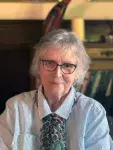
A historian known for recovering the histories of German-Jewish families is being celebrated with an honorary degree from Kwantlen Polytechnic University (KPU)..
Dr. Sharon Meen will receive a doctor of letters during afternoon convocation ceremonies on June 13 at KPU Surrey, where nearly 1,400 graduates are expected to walk across the stage from June 12 to 16.
“Sharon Meen is an outstanding individual whose dedication to teaching and research honours the German-Jewish families who suffered under Nazi rule. Her contributions to the public's understanding of history are significant,” says Dr. Alan Davis, KPU President and Vice-Chancellor. “She exemplifies KPU’s distinction – where thought meets action – by using her scholarly work to rebuild communities.”
Meen, who holds a PhD in history from University of B.C. (UBC) and a master's degree in history from University of Toronto, started learning the German language while in high school in Ontario and never stopped.
After graduating with her doctorate in Canadian, German, and Latin American history in 1978, Meen began a career in post-secondary education. She taught at UBC and Simon Fraser University before moving into the role of dean of arts and science at B.C. Open University (BCOU) from 1992 to 2002.
As an administrator, Meen pioneered innovative arrangements for students. At BCOU she developed post-secondary institution-to-institution collaborative degrees. She also developed a program for Ontario autoworkers to use employment training to complete their degrees.
"I came to realize that a terrific amount of university-level learning takes place outside of the normal university environment. This was initially somewhat of a surprise. But the rigorous processes by which the BCOU determined whether or not credit in other programs could be used to complete BCOU degrees convinced me that BCOU was making an exciting and innovative contribution to post-secondary education," says Meen.
Pursuing her passion for German history in 2002, Meen began volunteering at the Vancouver Holocaust Education Centre (VHEC) as a German-English translator.
"This opened a whole new world, and introduced me to the Jewish community of Vancouver and the need for translation of official documents from the German government."
Her previous academic work in German history introduced her to two major research projects: the story of Manfred Rosengarten, whose son donated his father's letters and photographs to the VHEC; and the story of the Hahn family, whose letters and documents Meen translated to tell a complex narrative.
This research led to the publication of a bilingual website in 2009 that served to bridge the past with the present, and to bring the diaspora of members of the Jewish families of Themar in Thuringia, Germany together. Meen later published another website to honour the 513 men, women, and children who were sent from Thuringian places to the Belzyce Ghetto on May 10, 1942.
Through her research, Meen connected the German-Jewish community with centuries of history, and her work to digitize these projects put Meen at the forefront of digital historical work. In 2013 Meen became an honorary citizen of Themar – the town at the heart of her research.
A commitment to civic engagement drives Meen's work, as does coming to terms with her past.
"I am a third generation white Anglo-Saxon Protestant Canadian. The world of my parents, and thus my world, was shaped by the 'none is too many' antisemitic attitude of the Canadian government toward Jews seeking refuge from Nazi Germany and Europe. I am shamed by my country's history," she says.
"With that as the motivation, I have found that this work uses every ounce of my professional training and experience, has taught me new skills, and given me opportunities I could never have imagined.
"I had been a historian trained in the use and analysis of dusty, dead documents. Suddenly I was doing history with live people to whom my ability to read and contextualize their precious documents provided the key to their understanding of a world they thought was lost forever. This is a very high-risk activity, but it has been unbelievably rewarding."